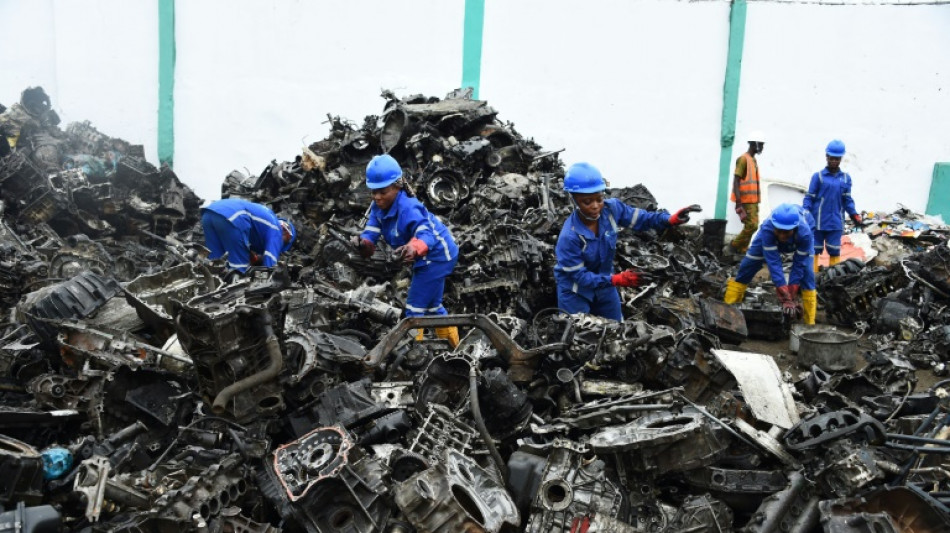
-
 Minneapolis activists track Trump's immigration enforcers
Minneapolis activists track Trump's immigration enforcers
-
Court orders Dutch to protect Caribbean island from climate change

-
 Sterling agrees Chelsea exit after troubled spell
Sterling agrees Chelsea exit after troubled spell
-
Rules-based trade with US is 'over': Canada central bank head

-
 Lucas Paqueta signs for Flamengo in record South American deal
Lucas Paqueta signs for Flamengo in record South American deal
-
Holocaust survivor urges German MPs to tackle resurgent antisemitism
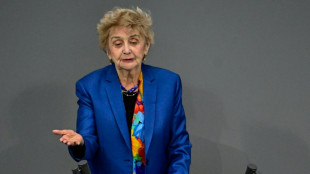
-
 'Extraordinary' trove of ancient species found in China quarry
'Extraordinary' trove of ancient species found in China quarry
-
Villa's Tielemans ruled out for up to 10 weeks

-
 Google unveils AI tool probing mysteries of human genome
Google unveils AI tool probing mysteries of human genome
-
UK proposes to let websites refuse Google AI search

-
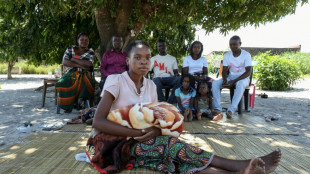 'I wanted to die': survivors recount Mozambique flood terror
'I wanted to die': survivors recount Mozambique flood terror
-
Trump issues fierce warning to Minneapolis mayor over immigration

-
 Anglican church's first female leader confirmed at London service
Anglican church's first female leader confirmed at London service
-
Germany cuts growth forecast as recovery slower than hoped
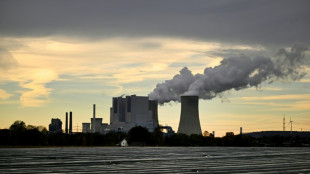
-
 Amazon to cut 16,000 jobs worldwide
Amazon to cut 16,000 jobs worldwide
-
One dead, five injured in clashes between Colombia football fans
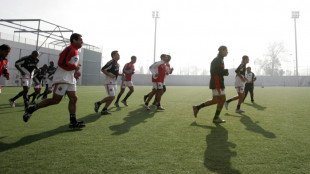
-
 Dollar halts descent, gold keeps climbing before Fed update
Dollar halts descent, gold keeps climbing before Fed update
-
US YouTuber IShowSpeed gains Ghanaian nationality at end of Africa tour

-
 Sweden plans to ban mobile phones in schools
Sweden plans to ban mobile phones in schools
-
Turkey football club faces probe over braids clip backing Syrian Kurds

-
 Deutsche Bank offices searched in money laundering probe
Deutsche Bank offices searched in money laundering probe
-
US embassy angers Danish veterans by removing flags

-
 Netherlands 'insufficiently' protects Caribbean island from climate change: court
Netherlands 'insufficiently' protects Caribbean island from climate change: court
-
Fury confirms April comeback fight against Makhmudov

-
 Susan Sarandon to be honoured at Spain's top film awards
Susan Sarandon to be honoured at Spain's top film awards
-
Trump says 'time running out' as Iran rejects talks amid 'threats'

-
 Spain eyes full service on train tragedy line in 10 days
Spain eyes full service on train tragedy line in 10 days
-
Greenland dispute 'strategic wake-up call for all of Europe,' says Macron

-
 'Intimidation and coercion': Iran pressuring families of killed protesters
'Intimidation and coercion': Iran pressuring families of killed protesters
-
Europe urged to 'step up' on defence as Trump upends ties

-
 Sinner hails 'inspiration' Djokovic ahead of Australian Open blockbuster
Sinner hails 'inspiration' Djokovic ahead of Australian Open blockbuster
-
Dollar rebounds while gold climbs again before Fed update

-
 Aki a doubt for Ireland's Six Nations opener over disciplinary issue
Aki a doubt for Ireland's Six Nations opener over disciplinary issue
-
West Ham sign Fulham winger Traore

-
 Relentless Sinner sets up Australian Open blockbuster with Djokovic
Relentless Sinner sets up Australian Open blockbuster with Djokovic
-
Israel prepares to bury last Gaza hostage

-
 Iran rejects talks with US amid military 'threats'
Iran rejects talks with US amid military 'threats'
-
Heart attack ends iconic French prop Atonio's career

-
 SKorean chip giant SK hynix posts record operating profit for 2025
SKorean chip giant SK hynix posts record operating profit for 2025
-
Greenland's elite dogsled unit patrols desolate, icy Arctic

-
 Dutch tech giant ASML posts bumper profits, cuts jobs
Dutch tech giant ASML posts bumper profits, cuts jobs
-
Musetti rues 'really painful' retirement after schooling Djokovic

-
 Russian volcano puts on display in latest eruption
Russian volcano puts on display in latest eruption
-
Thailand uses contraceptive vaccine to limit wild elephant births

-
 Djokovic gets lucky to join Pegula, Rybakina in Melbourne semi-finals
Djokovic gets lucky to join Pegula, Rybakina in Melbourne semi-finals
-
Trump says to 'de-escalate' Minneapolis, as aide questions agents' 'protocol'

-
 'Extremely lucky' Djokovic into Melbourne semi-finals as Musetti retires
'Extremely lucky' Djokovic into Melbourne semi-finals as Musetti retires
-
'Animals in a zoo': Players back Gauff call for more privacy

-
 Starmer heads to China to defend 'pragmatic' partnership
Starmer heads to China to defend 'pragmatic' partnership
-
Uganda's Quidditch players with global dreams


In Nigeria, finding value in waste recycling
Mounds of waste scattered along roads and vast landfills are a Nigerian eyesore.
In Africa's biggest economy and most populous country, collecting, sorting and recycling trash is despairingly rare.
But there is also good news. Some entrepreneurs are working hard to tackle the rubbish mountain, despite the many challenges.
Romco Metals started recycling aluminium at its factory outside Lagos in 2015, drawn by global demand for the light, strong, flexible metal.
Buoyed by good results, it built a second facility outside Ghana's capital Accra and now plans to open at least three new plants across Africa and triple production by 2025.
Aluminium is the world's second most-used metal after steel and used widely in construction, medicine and car-making.
"Electric vehicles require more durable lighter material such as aluminium, and that’s where our materials end up," said the company's youthful founder, 32-year-old Raymond Onovwigun.
- Job creation -
A British-registered company, Romco melts down and recycles around 1,500 tonnes of discarded aluminium per month, out of a capacity of 3,000 tonnes.
It says it has created 450 direct jobs -- 5,000 in total, in this labour-intensive sector -- and plans to double that number within a year.
"Before... there was no work," community leader Bankole Gbenga known as Chief Abore told AFP during a recent visit to the Lagos facility.
Chief Abore says more than a hundred young people from his community alone now work for Romco in some capacity.
"Some are doing carpentry, some are welders... some of the youth are doing security," said the 40-year-old.
Among those who have most benefited from Romco’s business are material suppliers like Mohammed Ashiru Madugu, who delivers several truckloads of metal scrap each week.
Madugu has a warehouse in northwestern Katsina, where suppliers from across the state and even neighbouring states bring him discarded metal.
He loads the goods onto trucks and sends them -– with escorts because of frequent ambushes by criminal gangs on the road –- all the way to Lagos, more than a thousand kilometres (600 miles) away.
For one truck, he can get paid up to 26 million naira (about $60,000 dollars) although the price fluctuates.
- Vast problem -
Only a tiny fraction of waste is recycled in Nigeria, a country of some 210 million consumers.
Plastic, metal and glass that in advanced economies are routinely picked up and processed are mostly tossed out.
Each year, Nigeria disgorges 200,000 tonnes of plastic into the Atlantic, the UN Industrial Development Organisation reported last year.
In Lagos alone, a city of more than 20 million people, less than 10 percent total recyclables are currently collected, Ibrahim Adejuwon Odumboni, managing director of the Lagos State Management Agency told AFP.
By comparison, in the UK, more than 41 percent of waste picked up by local authorities was recycled last year, according to British statistics.
For Odumboni, recycling initiatives are to be commended but more should be done by the companies making aluminium beverage cans and other products.
"We need the manufacturers to invest in the collection system. In many parts of the world, a portion of what producers sell is going into the recovery of products. We currently don't have that in Nigeria," he said.
If companies selling aluminium products "are not held responsible (for collecting waste) then it doesn’t make any sense -- we're just going round and round in circle."
He blames poor legislation but says an improved law on Extended Producer Responsibility (EPR) is currently being discussed in the state house of assembly.
EPR is an environmental policy in place in many countries that gives producers incentives to take responsibility for their products after they are used.
Another challenge for recyclers is carbon emissions from the energy they use to crush, shred or melt old materials.
Romco, for instance, uses compressed natural gas to turn the aluminium into ingots.
"(It) is still a fossil fuel but the best, most efficient fossil fuel. It doesn’t contain lead or sulphur," said Onovwigun.
The company says, however, that it wants to be independent of fossil fuels and is "exploring the potential of using solar, green hydrogen, and biofuels."
W.Lapointe--BTB


